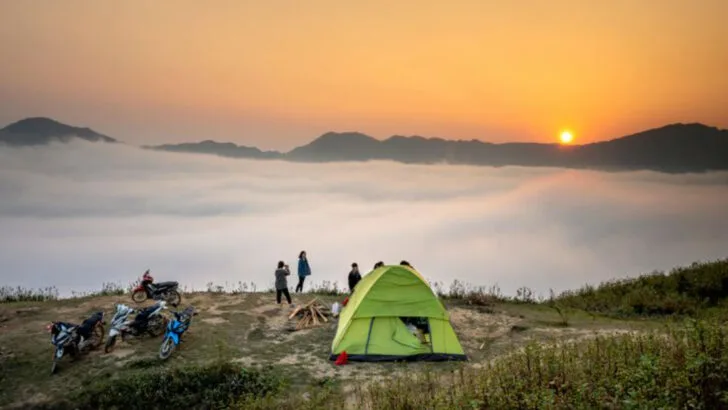Ask any frequent camper, and they’ll tell you that the difference between a perfect trip and a frustrating one often comes down to the details. From gear choices to campsite habits, these small decisions shape the comfort, safety, and rhythm of life outdoors.
Here’s what seasoned campers swear by—the essentials and oversights that can make or break any camping trip, no matter how beautiful the setting.
Proper Tent Setup and Waterproofing
A tent is more than just a shelter; it’s your fortress in the wilderness. Imagine a downpour seeping through every seam and zipper because waterproofing was neglected. Ensuring your tent is set up correctly and sealed tight keeps you dry and comfortable.
Double-checking the tent’s position can prevent a miserable night on uneven ground. The effort invested in pitching it right pays off when those storm clouds roll in unexpectedly.
Did you know? Many campers bring an extra tarp for under the tent to add a layer of protection against both moisture and cold.
Quality Sleeping Pad and Warm Sleeping Bag
Waking up with a sore back is no way to start an adventure. Investing in a good sleeping pad provides essential cushioning against the earth’s hard surface. Meanwhile, a warm sleeping bag wraps you in comfort, warding off the night chill.
The difference between shivering all night and a restful slumber can determine your energy and mood the next day. Seasoned campers swear by layering, even inside the sleeping bag, for extra warmth.
Fun fact: Sleeping bags are rated by temperature, so choose one based on expected weather to ensure a cozy experience.
Reliable Light Source (Lantern or Headlamp)
As darkness descends, a dependable light source becomes your best friend. Whether it’s a lantern casting a glow over your campsite or a headlamp lighting the trail, visibility is crucial.
Imagine preparing dinner or navigating to the restroom without any light. It’s an experience that every camper should avoid. Both hands-free and ambient options allow flexibility for various tasks.
Did you know? Modern LED headlamps are energy-efficient and can last for dozens of hours on a single set of batteries, making them ideal for extended trips.
Meal Prep and Easy-to-Cook Food
Great meals are the heart of memorable camping experiences. Prepping ingredients at home can turn cooking into a relaxed affair rather than a chore. Think about those easy-to-cook meals that pack flavor without fuss.
Imagine ending a long hike and having a hot meal ready in minutes. Seasoned campers often prepare foil-wrapped dinners that bake right on the coals, offering a no-cleanup solution.
Pro tip: Pre-mixed pancake batter in a squeeze bottle can make morning breakfast a breeze, giving you more time to enjoy the surroundings.
Dry Firewood or Backup Fuel
Picture this: a chilly evening without a fire to gather around. Dry firewood is as precious as gold in the wilderness. It’s not just about warmth; it’s the lifeline for cooking and socializing.
When nature fails to provide dry wood, having backup propane or charcoal can save the day. Always check local restrictions, as some areas prohibit wood fires for safety.
Did you know? Many experienced campers pack fire starters like cotton balls soaked in petroleum jelly to ensure they can ignite a fire under any condition.
Bug Repellent and Sunscreen
Nature’s beauty comes with a few pesky companions. Effective bug repellent can make the difference between a serene outing and a swat-filled battle. Meanwhile, sunscreen protects against harsh UV rays, preventing burns.
Imagine an afternoon ruined by mosquitoes or a painful sunburn. Combining both into your routine secures your comfort and health. Many campers opt for natural repellents to avoid harsh chemicals.
Interesting fact: Some essential oils, like citronella and eucalyptus, are known for their natural bug-repelling properties and are used in many eco-friendly products.
Layered Clothing for Changing Weather
Weather in the wild can be unpredictable. Layering clothing ensures you’re prepared for anything from scorching noon heat to chilly evening breezes.
Think of your clothing as a dynamic system where adding or removing layers regulates your body temperature. This approach prevents you from being caught off-guard by sudden weather changes.
Did you know? Merino wool is a favorite among campers for its ability to retain warmth even when wet, making it an ideal base layer choice for unpredictable climates.
Customized First Aid Kit
Imagine you’re deep into a hike when a scrape threatens to ruin the day. A customized first aid kit is the camper’s best ally. Tailored to specific needs and potential hazards of the destination, it offers peace of mind and ensures minor mishaps don’t escalate.
Including items like blister pads and allergy medications, this kit is more than basic—it’s personal. It empowers campers to handle unexpected situations with confidence. By preparing for the unpredictable, it transforms potential stress into mere inconvenience.
Fun fact: Ancient Greeks carried honey as a natural antiseptic in their primitive first aid kits!
Clever Camp Storage Solutions
An organized campsite is the heartbeat of a stress-free trip. Clever camp storage solutions keep chaos at bay, ensuring gear is both accessible and secure. Items like collapsible crates and hanging organizers add efficiency to the setup.
These tools allow campers to maximize space, making it easier to locate essentials without disruption. Such smart organization turns packing and unpacking into a breeze, letting nature remain the focal point.
Did you know? Traditional Bedouin camps use distinct color-coding systems for quick identification of belongings during travel.
Portable Solar Charger
In today’s tech-reliant world, a dead phone can be a camper’s nightmare. A portable solar charger ensures gadgets remain powered, providing connectivity and safety. Harnessing the sun’s energy, it offers a sustainable way to keep devices operational.
This tool is especially vital for emergencies or capturing unforgettable memories. It blends the serenity of nature with the convenience of modern technology, without compromising the experience.
Fun fact: The first solar panel was invented in 1954, marking the beginning of solar-powered adventures!

